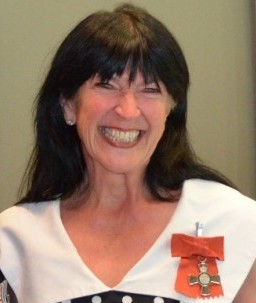Related Research Articles

The cornett (Italian: cornetto, German: Zink) is a lip-reed wind instrument that dates from the Medieval, Renaissance and Baroque periods, popular from 1500 to 1650. Although smaller and larger sizes were made in both straight and curved forms, surviving cornetts are mostly curved, built in the treble size from 51 to 63 cm (20 to 25 in) in length, usually described as in G. The note sounded with all finger-holes covered is A3, which can be lowered a further whole tone to G by slackening the embouchure. The name cornett comes from the Italian cornetto, meaning "small horn".
The musical term alto, meaning "high" in Italian, historically refers to the contrapuntal part higher than the tenor and its associated vocal range. In four-part voice leading alto is the second-highest part, sung in choruses by either low women's or high men's voices. In vocal classification these are usually called contralto and male alto or countertenor.

Michael Laurence Nyman, CBE is an English composer, pianist, librettist, musicologist, and filmmaker. He is known for numerous film scores, and his multi-platinum soundtrack album to Jane Campion's The Piano. He has written a number of operas, including The Man Who Mistook His Wife for a Hat; Letters, Riddles and Writs; Noises, Sounds & Sweet Airs; Facing Goya; Man and Boy: Dada; Love Counts; and Sparkie: Cage and Beyond. He has written six concerti, five string quartets, and many other chamber works, many for his Michael Nyman Band. He is also a performing pianist. Nyman prefers to write opera over other forms of music.
A male soprano or boy treble is a young male singer with a voice in the soprano range, a range that is often still called the treble voice range no matter how old.
Vocal range is the range of pitches that a human voice can phonate. A common application is within the context of singing, where it is used as a defining characteristic for classifying singing voices into voice types. It is also a topic of study within linguistics, phonetics, and speech-language pathology, particularly in relation to the study of tonal languages and certain types of vocal disorders, although it has little practical application in terms of speech.

Camilla Ella Williams was an American operatic soprano who performed nationally and internationally. After studying with renowned teachers in New York City, she was the first African American to receive a regular contract with a major American opera company, the New York City Opera. She had earlier won honors in vocal competitions and the Marian Anderson Fellowship in 1943–44.

Ode for St. Cecilia's Day, HWV 76, is a cantata composed by George Frideric Handel in 1739. The title of the cantata refers to Saint Cecilia, the patron saint of musicians. The premiere was on 22 November 1739 at the Theatre in Lincoln's Inn Fields, London.
Dame Judith Weir is a British composer. She served as Master of the King's Music from 2014 to 2024. Appointed by Queen Elizabeth II, Weir was the first woman to hold this office.

The Indiana University Jacobs School of Music in Bloomington, Indiana, is a music conservatory established in 1921. Until 2005, it was known as the Indiana University School of Music. It has more than 1,500 students, approximately half of whom are undergraduates, with the second largest enrollment of all music schools accredited by the National Association of Schools of Music.
Bernard Rands is a British-American contemporary classical composer. He studied music and English literature at the University of Wales, Bangor, and composition with Pierre Boulez and Bruno Maderna in Darmstadt, Germany, and with Luigi Dallapiccola and Luciano Berio in Milan, Italy. He held residencies at Princeton University, the University of Illinois, and the University of York before emigrating to the United States in 1975; he became a U.S. citizen in 1983. In 1984, Rands's Canti del Sole, premiered by Paul Sperry, Zubin Mehta, and the New York Philharmonic, won the Pulitzer Prize for Music. He has since taught at the University of California, San Diego, the Juilliard School, Yale University, and Boston University. From 1988 to 2005 he taught at Harvard University, where he is Walter Bigelow Rosen Professor of Music Emeritus.

A Ceremony of Carols, Op. 28 is an extended choral composition for Christmas by Benjamin Britten scored for three-part treble chorus, solo voices, and harp. The text, structured in eleven movements, is taken from The English Galaxy of Shorter Poems, edited by Gerald Bullett. It is principally in Middle English, with some Latin and Early Modern English. It was composed in 1942 on Britten's sea voyage from the United States to England.
Edwin Penhorwood is an American composer who is an assistant professor at the Jacobs School of Music at Indiana University.
A voice type is a group of voices with similar vocal ranges, capable of singing in a similar tessitura, and with similar vocal transition points (passaggi). Voice classification is most strongly associated with European classical music, though it, and the terms it utilizes, are used in other styles of music as well.

"In dulci jubilo" is a traditional Christmas carol. In its original setting, the carol is a macaronic text of German and Latin dating from the Middle Ages. Subsequent translations into English, such as J. M. Neale's arrangement "Good Christian Men, Rejoice" have increased its popularity, and Robert Pearsall's 1837 macaronic translation is a mainstay of the Christmas Nine Lessons and Carols repertoire. J. S. Bach's chorale prelude based on the tune is also a traditional postlude for Christmas services.
There is no authoritative system of voice classification in non-classical music as classical terms are used to describe not merely various vocal ranges, but specific vocal timbres unique to each range. These timbres are produced by classical training techniques with which most popular singers are not intimately familiar, and which even those that are do not universally employ them.
Sacred Concert by Duke Ellington is one of the following realisations:

Freitag aus Licht, the main body of which is also titled Freitag-Versuchung, is the fifth to be composed of the seven operas that comprise Licht (Light), by Karlheinz Stockhausen. It was the last of the operas to receive a staged production with the composer's involvement.

Stabat Mater is a work by Gioachino Rossini based on the traditional structure of the Stabat Mater sequence for chorus and soloists. It was composed late in his career after retiring from the composition of opera. He began the work in 1831 but did not complete it until 1841.

Messiah, the English-language oratorio composed by George Frideric Handel in 1741, is structured in three parts. This listing covers Part II in a table and comments on individual movements, reflecting the relation of the musical setting to the text. Part I begins with the prophecy of the Messiah and his birth, shows the annunciation to the shepherds and reflects the Messiah's deeds on earth. Part II covers the Passion in nine movements including the oratorio's longest movement, an air for alto He was despised, then mentions death, resurrection, ascension, and reflects the spreading of the Gospel and its rejection. The part is concluded by a scene called "God's Triumph" that culminates in the Hallelujah chorus. Part III of the oratorio concentrates on Paul's teaching of the resurrection of the dead and Christ's glorification in heaven.

Helen Medlyn is a New Zealand mezzo-soprano opera singer, musical theatre actor, media producer and gardener. She is particularly known for her comic roles and for her cabaret performances.
References
- Western Gazette (Canada) review by Mary Ann Boateng Too Many Sopranos hits all the right notes: Opera stereotypes exposed in Edwin Penhorwood production (March 25, 2009), accessed 5 February 2010
- Portland Press Herald review by Christopher Hyde, Portland Press Herald (June 22, 2008) 'Too Many Sopranos' hits the high notes on Port Opera page, accessed 5 February 2010